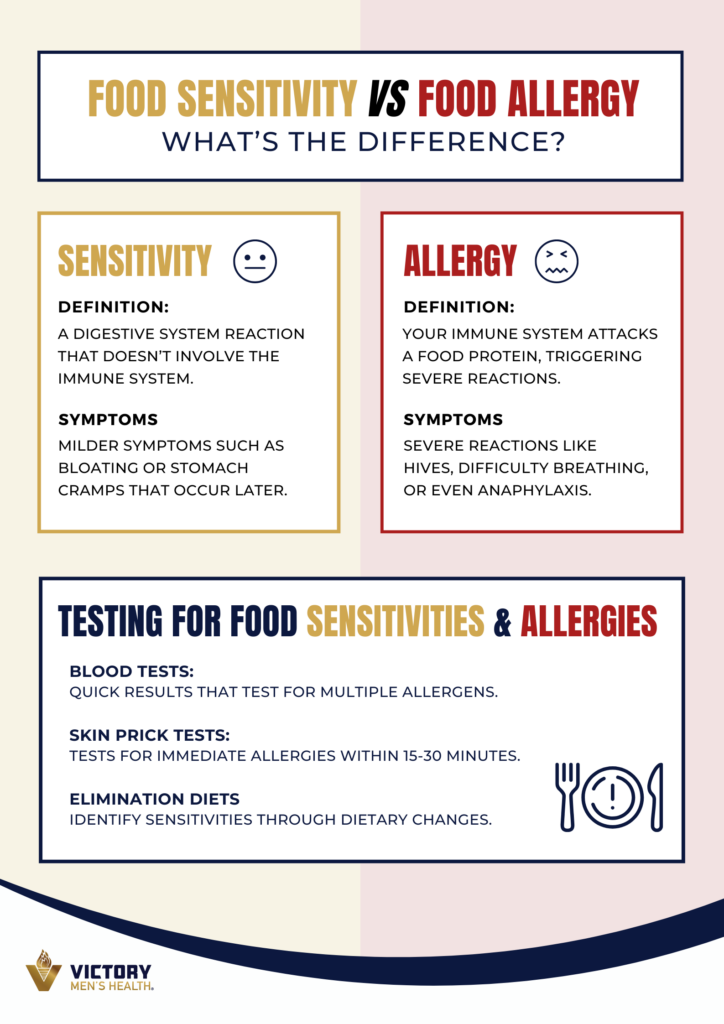What Are Food Sensitivity Tests and How Do They Work?
category: Health Optimization

Food sensitivities can be tricky to pin down, and getting the right answers requires more than guesswork. If you break out in hives every time you eat a fruit salad, you might be wondering: what are food sensitivity tests, and how do they work?
While food allergies cause immediate and often noticeable reactions, food sensitivities can trigger a wide range of delayed and frustrating symptoms, from mild discomfort to chronic inflammation. Luckily, food sensitivity tests can tell you which foods might be contributing to any immune responses you’re experiencing.
At Victory Men’s Health, we take a holistic approach to your health and well-being. While we don’t provide traditional food allergy testing for IgE-mediated responses (typically done by an immunologist), we can help you understand your body’s response to certain foods through comprehensive food sensitivity testing.
Ready to stop guessing and start getting answers? Let’s dive in.

What Are Common Food Sensitivities?
When it comes to food sensitivities, certain culprits are more common than others. Foods like gluten and dairy are often triggers, but other cross-reactive foods might cause issues, even if these are eliminated. Common food sensitivities include:
- Gluten
- Dairy
- Eggs
- Soy
- Corn
- Nuts
- Nightshades
These foods can lead to delayed immune reactions and chronic low-grade inflammation, which might contribute to conditions like autoimmune diseases. If you’ve experienced bloating, fatigue, or other symptoms after eating certain foods, you might have a food sensitivity.
What Are the Symptoms of Food Sensitivities?
Food sensitivities often show up in more subtle ways compared to allergies. Symptoms can take hours or even days to appear, making it difficult to connect them to specific foods. Some of the most common signs include:
- Bloating or gas
- Fatigue
- Headaches
- Digestive issues (diarrhea, constipation, or stomach cramps)
- Joint pain or inflammation
- Skin issues (eczema or acne)
If you’ve noticed any of these symptoms after eating certain foods, consider getting tested. No one should have to live in fear of their next meal. The sooner you get to the root cause of the reaction, the sooner you can take control of your health.
Food Allergy vs. Food Sensitivity: What’s the Difference?
There’s a big difference between having a food allergy and a food sensitivity, though people often confuse the two, so let’s quickly clear things up. When you come to our clinic, our comprehensive food sensitivity test will help you understand whether certain foods are affecting you as a result of an allergy or a sensitivity.
- Food Allergy (IgE-mediated response): This happens when your immune system mistakes a food protein as a harmful invader, causing an immediate and sometimes dangerous reaction. Allergies are typically tested using IgE-mediated tests conducted by an immunologist.
- Food Sensitivity (IgG-mediated response): Unlike allergies, sensitivities don’t cause immediate reactions. Instead, they result in delayed, low-grade immune responses that can lead to chronic inflammation and other health issues. Symptoms might be subtler, such as bloating, cramps, fatigue, or headaches, and can take longer to notice.

Food Sensitivity Testing Methods
Do you feel bloated whenever you eat a certain food? If you’re wondering whether you might have a food allergy or sensitivity, the next step is testing. Here are the food sensitivity testing methods we recommend:
1. Cyrex Array 10
3. Elimination Diet
Cyrex Array 10
One of the most advanced food sensitivity tests available, this food sensitivity test looks for IgG-mediated immune responses, helping to identify sensitivities that could be contributing to chronic inflammation and other health problems.
The Cyrex Array 10 screens for reactivity to 180 food antigens in various forms (raw, cooked, modified, or processed), offering a comprehensive view of how your body responds to different foods. The test is highly accurate, as each food antigen is tested multiple times to ensure reproducibility.
Best for: People with chronic symptoms like fatigue, digestive issues, or joint pain who are looking to identify potential food sensitivities.
How long it takes: Results typically take a few days to a week.
Elimination Diet
This method involves removing certain foods from your diet for a few weeks, then slowly reintroducing them one at a time while monitoring for symptoms. It’s not a test in the traditional sense, but it can be an effective way to uncover sensitivities that might not show up in standard food allergy tests.
An elimination diet works best for people who are dealing with chronic symptoms like bloating, headaches, or fatigue that don’t seem to have an obvious trigger. It requires some patience and discipline, but it’s a great option for anyone looking for a natural approach to diagnosis.
- Best for: Identifying food sensitivities and delayed reactions.
- How long it takes: Several weeks, depending on the number of foods tested.
What’s the Best Food Sensitivity Test? Here’s What We Recommend.
At Victory Men’s Health, we offer several types of tests designed to provide the insights you need to feel your best. One of these options is one of the most advanced food sensitivity tests available: the Cyrex Array 10.
This test doesn’t just measure reactions to a handful of foods—it screens for reactivity to 180 different food antigens, looking at how your body responds to foods in various forms: raw, cooked, modified, or processed. You might tolerate raw broccoli but have a reaction to it when it’s cooked, and the Cyrex Array 10 picks up on these variations.
What makes this test even more valuable? Its ability to detect the loss of immune tolerance, which shows when your immune system no longer tolerates a specific food by measuring elevated or out-of-range antibodies.
Based on your results, we may recommend additional Cyrex tests, such as wheat/gluten reactivity or autoimmunity screening, to give you a clearer picture of your health.
Can You Test for Food Allergies at Home?
With so many at-home health tests available these days, you might think you can take care of your concerns from the comfort of your couch. However, when it comes to food testing, things aren’t as straightforward. We recommend avoiding an at-home food sensitivity test and coming in for more accurate, safe results.
Food allergies and sensitivities are complex, and testing for them involves more than just getting a quick readout. At-home tests are known for false positives or negatives, which can lead to a lot of confusion. Proper food allergy tests require professional oversight to ensure the results are both accurate and interpreted correctly.
Without guidance, an incorrect result could lead to dangerous decisions—like continuing to eat foods that trigger a reaction or unnecessarily cutting out foods that are perfectly safe for you. Working with a healthcare provider is always the safest and most reliable option. We’ll ensure you get accurate results and help you develop a plan to manage any food allergies or sensitivities.
Ready to Get a Clear Picture of Your Health?
Understanding your body is the first step to improving your health, and food sensitivity testing can give you valuable insights. Our comprehensive food sensitivity testing service is designed to give you a detailed picture of how your body reacts to different foods.
If you’re experiencing symptoms or just curious about potential allergies or sensitivities, let us help you eliminate the guesswork. Contact us today to schedule a consultation and take control of your health.